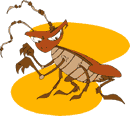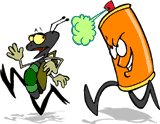|
They say that cockroaches will be around long after man is gone, so you'd better transfer all your
 boxes of cereal to Tupperwares before the end of the world comes! Will cockroaches survive because they are so tough and we are such sissies? The heel on my boot thinks not! It's because they are well designed bugs that adapt well to changing environmental conditions.
boxes of cereal to Tupperwares before the end of the world comes! Will cockroaches survive because they are so tough and we are such sissies? The heel on my boot thinks not! It's because they are well designed bugs that adapt well to changing environmental conditions.
An interesting study was published a couple of years ago that explained how fruit flies were found to be resistant to DDT, which is one of our more potent insecticides (and which is also banned in the US). The trick that the fruit flies learned was to increase production of an enzyme that allows them to metabolize the insecticide—to actually use the poison we apply to kill them as a source of energy. It's sort of like a sci-fi movie where the energy-sucking alien gets stronger as the space cadet blasts it with his ray gun.
What we have on our hands in this resistant species of fruit fly is an "adaptive" pest—one that adjusts to and overcomes environmental roadblocks. All pests do this; in fact, all species do this. It's a fundamental law of random genetic mutations, some of which provide advantages to a few members of the species. As the non-advantaged members of the species succumb to the environmental problem—in this case, a pesticide—the offspring of the resistant member become the dominant strain in the species. It's simply survival of the fittest.
Not all species benefit equally from evolutionary adaptation. The shorter the reproductive cycle, the more chance the species can adapt to a problem. That's what makes little buggers like fruit flies and cockroaches so durable.
 So, are we faced with little monsters that won't die, no matter how much poison we spray on them? To an extent, yes. But there is a good solution: adaptive pesticides—that is, pest-control methods that adapt to the pests' own adaptations. Fortunately, we have these control methods already—they are part of nature. For every pest, there are a number of natural forces that keep its numbers in check. Such a "biological control" might be a predatory insect, such as a ladybug. There are over 900,000 known species of the insects that prey on other insects. Anti-insect life forms also include higher animals such as birds, rodents, or amphibians that eat insects. Even fungus, molds, bacteria, viruses, and parasites can work to keep some pests' numbers down.
So, are we faced with little monsters that won't die, no matter how much poison we spray on them? To an extent, yes. But there is a good solution: adaptive pesticides—that is, pest-control methods that adapt to the pests' own adaptations. Fortunately, we have these control methods already—they are part of nature. For every pest, there are a number of natural forces that keep its numbers in check. Such a "biological control" might be a predatory insect, such as a ladybug. There are over 900,000 known species of the insects that prey on other insects. Anti-insect life forms also include higher animals such as birds, rodents, or amphibians that eat insects. Even fungus, molds, bacteria, viruses, and parasites can work to keep some pests' numbers down.
 As a pest evolves, so do the predator species. In the natural world, it's a constant arms race, and neither side can usually win. But by the same token, when we douse the planet with toxic insecticides, we can all lose, especially those of us with longer reproductive cycles that don't adapt as quickly to environmental challenges. The loss of predator species is a particularly bad downside of chemical pesticide use. They often fail to adapt to pesticides as quickly as the target pests, so when the target pest numbers recover and start to become resistant to the pesticides, the numbers of predators are still low, resulting in a backlash increase in pest populations.
As a pest evolves, so do the predator species. In the natural world, it's a constant arms race, and neither side can usually win. But by the same token, when we douse the planet with toxic insecticides, we can all lose, especially those of us with longer reproductive cycles that don't adapt as quickly to environmental challenges. The loss of predator species is a particularly bad downside of chemical pesticide use. They often fail to adapt to pesticides as quickly as the target pests, so when the target pest numbers recover and start to become resistant to the pesticides, the numbers of predators are still low, resulting in a backlash increase in pest populations.
Plants can also serve as natural insect-control agents. For instance, planting marigolds
 around the edge of a garden is an old trick. The marigolds contain natural chemicals that discourage pests from infesting nearby plants.
around the edge of a garden is an old trick. The marigolds contain natural chemicals that discourage pests from infesting nearby plants.
Biological control methods are starting to get wider use these days because they are non-toxic and usually more effective in the long run. Their initial cost may be higher, but given their higher effectiveness and lower impact on non-target species, they are a bargain.
|


